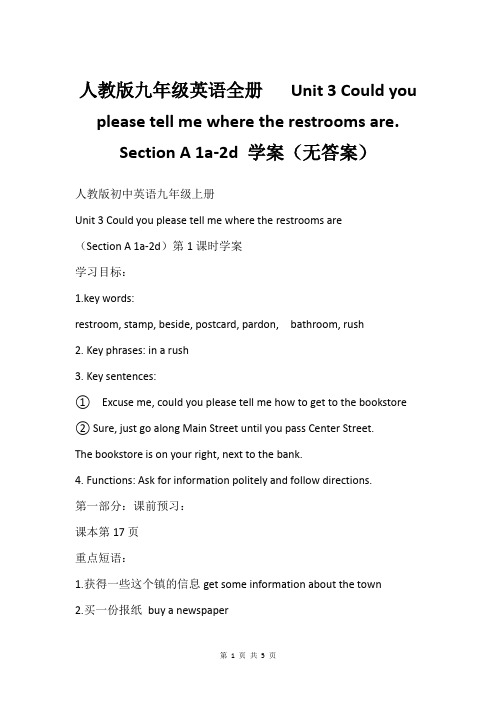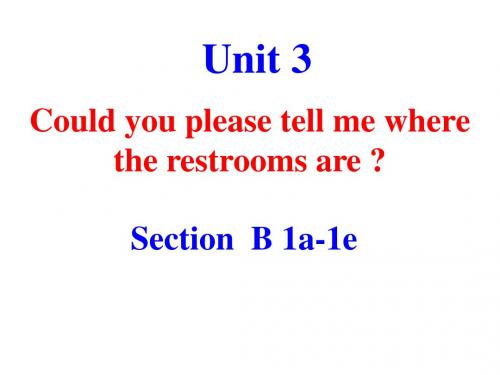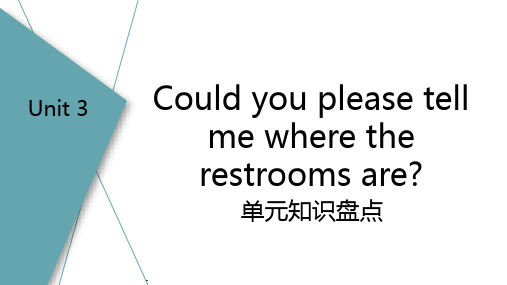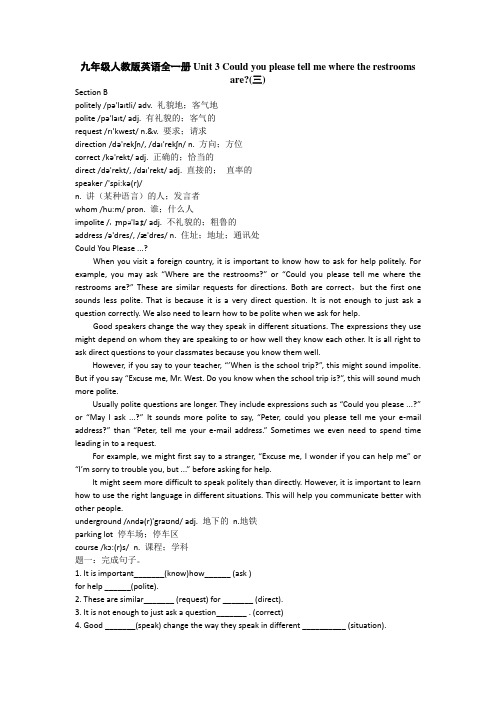【人教版】九年级英语Unit3couldyoupleasetellmewheretherestroomsare短语和练习题
英语人教版九年级全册Unit3 Could you please tell m

Unit 3 Could you please tell me where the restrooms are? Teaching aim: In this class the students understand how to use polite and correct language by reading.Teaching important point: Use the correct language.Teaching difficult point : Use the correct language.Teaching process:Step 1. Leading inT: Look at the picture. Read the conversation. Do they know each other? S: No, they don’t.T: What do you think of this question?S: It’s polite.Then lead in the new words.Step 2. Learning new wordsT:Look at the sentences. Read them by yourselves.The students learn the new words: polite, politely, impolite,direct, directly, correct, correctly, request.Step 3. Pre- readingLet’s discuss. Where do you need to make polite requests? Think of some possible situations. Discuss them with your partner.Step 4. While- readingFirst, the students read the reading strategy. Then look at some questions. The students read the questions individually. Next ,read the article withthese questions.Read aloud. Next, finish these questions.Then read after the teacher. After reading, underline the topic sentences for each paragraph. Then finish 2c and 2d.Step 5. Post- readingT: Now look at the blackboard. Let’s retell the article. You can follow me. ( The teacher draw the mind map on the blackboard.)Then work in groups. The student from each paragraph comes to the blackboard and retell the article.Step 6. SummaryWhat have you learnt in this class? The students summarize individually, then the teacher helps.Step7. Homework:。
英语人教版九年级全册Unit 3 Could you please ……

Unit 3 Could you please tell me where the restrooms are?课堂活动单 课 题 Unit 3 Could you please tell me where the restrooms are? Period 6 Section B(3a -Self Check)活动三、完成教材Self Check 的任务1.学生齐读1方框中的单词,然后用方框中的单词补全对话,完成后小组内互相交流答案,然后两人一组互相练习对话。
(2分钟)2.阅读2中的例句,然后根据提示写出问题及答语,完成后小组内互相交流答案。
(3分钟) 3.两人一组练习对话,并在小组内表演。
问题探究( )1.Could you tell me ________,please?A .who knew the answersB .who the answers knowC .who knows the answers答案选择C ,连接词在从句中作主语时,后面直接跟谓语动词。
Could 表示委婉的语气,而不表示时态,因此答案选择C 。
课堂检测根据句意,用所给单词的适当形式填空。
1、Thank you for (help) me to repair my bike.2、A good (speak) should be a good listener first.3、The shops are in a (center)place of the city.4、He suggested (go) out for a walk.5、I don ’t know (who) to give it to.完成句子。
1、请别迟到,准时来这里。
Please don ’t be e here .2、打扰一下,您可以告诉我最近的洗手间在哪里吗?Excuse me ,could you tell me restroom3、在我每天上学的路上,我都要路过一个超市。
人教版九年级英语全册 Unit 3 Could you please tell me where

人教版九年级英语全册Unit 3 Could you please tell me where the restrooms are.Section A 1a-2d 学案(无答案)人教版初中英语九年级上册Unit 3 Could you please tell me where the restrooms are(Section A 1a-2d)第1课时学案学习目标:1.key words:restroom, stamp, beside, postcard, pardon, bathroom, rush2. Key phrases: in a rush3. Key sentences:① Excuse me, could you please tell me how to get to the bookstore② Sure, just go along Main Street until you pass Center Street.The bookstore is on your right, next to the bank.4. Functions: Ask for information politely and follow directions.第一部分:课前预习:课本第17页重点短语:1.获得一些这个镇的信息get some information about the town2.买一份报纸buy a newspaper3.买一双鞋子buy a pair of shoes4.沿着主街走go along Main Street5.在你的左边/右边on your left/right6.在银行的旁边beside the bank/next to the bank重点句子:你能告诉我怎样到达书店吗?Could you please tell me how to get to the bookstore你知道书店今天什么时候关门吗?Do you know when the bookstore closes today请问你能告诉我洗手间在哪儿吗?Could you please tell me where the restrooms are课本第18页重点短语:1.去三楼/在三楼go to the third floor/ on the third floor2.在第二个路口左拐/右拐turn left / right at the second crossing3.经过书店(2种)go past the bookstore/pass the bookstore4.最大的娱乐公园the biggest amusement park做某事是兴奋的be excited to do sth.6.开始start with/ begin with重点句子:我会快点儿。
人教版九年级英语全一册Unit3Couldyoupleasetellmewheretherestroomsare全单元教案(5课时)

Unit 3Could you please tell me where the restrooms are?本单元围绕游览出行这一话题展开学习。
SectionA以购物和去游乐园游玩等日常活动为切入点,通过问路、指路的话语进行语言的操练和学习,学生可以通过模拟日常生活的场景来体会、感受和领悟本单元的语言目标内容。
在Secti onA部分,要求学生重点掌握并能熟练、正确地运用以下内容:一、在语言功能和结构方面:(1)得体地运用礼貌语句问路及咨询信息,例如:Excuse me,do you know where I can…/Could you please tell me how to get to…/Can you tell me…/I wonder where we should…;(2)礼貌地、得体地指路或提供信息,例如:Sure…或得体地给予否定回答,如:Sorry,I'm not sure how to get there.二、在词汇方面:学会教材里呈现的日常活动的短语和相关处所的名词,以及问路、指路及咨询、提供相关信息的短语等;(3)在语法方面:学会带有wh-疑问词的宾语从句。
The First Period—Section A(1a-2d)Teaching Important Points【教学重点】Key words & phrases:restroom,stamp,beside,postcard,pardon,bathroom,rushgo along,on your right,turn right/left,go past,no problemKey sentences:1.—Excuse me,do you know where I can buy some medicine?—Sure.There's a supermarket down the street.2.—Could you please tell me how to get to the bookstore?—Sure,just go along Main Street until you pass Center Street.The bookstore is on your right,beside the bank.3.Sorry,I'm not sure how to get there.Key structure:verb+wh-word+objective clauseeg:Could you tell me where the restrooms are?Teaching Difficult Points【教学难点】★Practice the structure “verb+wh-word+objective clause” in listening and speaking.Teaching Aids【教学工具】A tape recorder,CAI or multimedia courseware.Teaching Steps【教学过程】★Step 1Leading in【新课导入】1.Greeting2.ReviewBriefly review the objective clauses with that and if/whether.2.PreparationShow pictures to review the words of different places in a city.Get the class to say the English names of the places.★Step 2Cooperative inquiry【合作探究】1.Finish the task in 1a①Show some stamps to the students and present the new sentences:Could you tell me where I can buy some stamp s?And then talk about the other things.②Read aloud the phrases in 1a.Match each thing with a place in the picture in 1a.2.Finish the task in 1b①Read the instructions.②Play the recording for the first time.Students only listen.③Play the recording a second time.Ask them to complete the conversation in the picture.④Check the answers with the whole class.Read the conversation in the picture.3.Finish the task in 1c①Read the model conversation in the box.②Pair work.③Ask some pairs of students to act out in class.4.Finish the tasks in 2a-2b①Show the picture.Talk about it with the students.Then read the instructions in 2a.Students guess what they will do.②Ask:What does the boy want to buy?Where can he buy it?③Play the recording for the first time.Students listen with the two questions.④Play the recording again.Students listen and finish the task in 2a.⑤Read the requirement in 2b and play the recording a third time.Ask some more questions.Finish the task in 2b.5.Finish the task in 2c6.F inish the task in 2d①Ask the class to read the conversation.②Explain some language points and the cultural knowledge.③Play the tape.Students repeat.Read aloud the conversation.Learn the new words and phrases.④Practice and then ask two pairs to act out the conversation.★Step 3Homework1.Collect the words of places in a city.2.Make a conversation,asking for a place and giving directions with polite languages. 3.Translate the following sentences into English.(1)打扰了,请问附近哪儿有银行?________________________________________________________________________ (2)您能不能告诉我到书店怎么走?________________________________________________________________________ (3)在银行和超市之间有一个花店。
人教新目标九年级英语全册课件《Unit 3 Could you ple

1e Role-play the conversations
between the clerk and the tourists.
A: Can you tell me where there’s a good place to eat?
B: Of course. What kind of food do you like?
interesting fascinating
Байду номын сангаас
inexpensive
quiet
uncrowded big beautiful
convenient safe clean
Places restaurant park subway mall
restroom museum
Qualities
inexpensive, big beautiful, fascinating uncrowded, safe, convenient
clerk tells her to go to the corner of Market and Middle Streets.
Conversation 3
The mother asks about ____a_m__u_s_e_u_m_. The father wants to go to a __h_i_st_o_r_y_ museum. The younger girl wants to go to a _s_c_ie_n_c_e_ museum. The boy wants to go to a _C_h_i_l_d_r_en__’s_ museum. The older girl wants to go to an __a_r_t __ museum. The clerk suggests they go to the _c_o_m_p_u__te_r_ museum.
人教版英语九年级上册 Unit 3 Could you please tell me whe

need to
than directly. However, it
spelnedadtiimneg is 9._i_m__p_o_r_t_a_n__t to 8. _in_t_o____a learn how to use the right
request. language in different
B 2b)
7. __l_o_n__g_e_r__.
They include
expressions such
as “Could you
please…?” or
“May I ask…?”
Sometimes It might seem more
we even difficult to speak politely
situations speaking to or how questions direct
well they know each because you questions.
other.
know them
well.
课文再现 Polite Usually polite
(Section questions questions are
situations. This will help
you 10._c_o_m__m__u_n__ic_a__te
better with others.
Unit 3
-
Could you please tell me where the restrooms are?
单元专题聚焦
解巧 析品 语 法
命题Байду номын сангаас报
项目
知识内容
3. Pardon me, do you know if there’s a restaurant around here? 经典句型 打扰一下,你知道这附近是否有餐厅吗?
人教版九年级英语《Unit 3 Could you please tell me where the

人教版九年级英语《Unit 3 Could you please tell me where the restrooms are?》Section B(2a-2d)教学设计一. 教材分析人教版九年级英语《Unit 3 Could you please tell me where the restrooms are?》Section B(2a-2d)主要介绍了日常生活中的一些常见场所和方位表达。
通过本节课的学习,学生能够熟练运用所学的词汇和句型,询问和描述某个场所的位置。
教材以真实的生活场景为背景,让学生在实际语境中学习英语,提高他们的语言运用能力。
二. 学情分析九年级的学生已经具备了一定的英语基础,能够听、说、读、写一些基本的英语句子。
但部分学生对英语学习的兴趣不高,课堂参与度较低。
针对这一情况,教师需要在教学中注重激发学生的学习兴趣,提高他们的课堂参与度。
同时,学生在生活中接触英语的机会较少,对于一些日常生活中的英语表达还不够熟悉,因此需要在课堂上多加操练。
三. 教学目标1.知识目标:学生能够掌握 Section B(2a-2d)中出现的词汇和句型,了解日常生活中的一些常见场所和方位表达。
2.能力目标:学生能够在实际情境中运用所学的词汇和句型,询问和描述某个场所的位置。
3.情感目标:通过本节课的学习,学生能够提高对英语学习的兴趣,增强自信心。
四. 教学重难点1.重点:Section B(2a-2d)中出现的词汇和句型。
2.难点:如何运用所学的词汇和句型,在实际情境中询问和描述某个场所的位置。
五. 教学方法1.情境教学法:通过设定真实的生活场景,让学生在实际语境中学习英语。
2.交际法:鼓励学生进行小组合作,进行实境模拟,提高他们的语言运用能力。
3.任务型教学法:通过完成具体任务,让学生在实践中学习和运用英语。
六. 教学准备1.教学课件:制作与本节课内容相关的课件,以便于引导学生进行学习。
2.教学素材:准备一些与日常生活相关的图片和地图,用于创设情境。
九年级人教版英语全一册Unit 3 Could you please tell me where t3

九年级人教版英语全一册Unit 3 Could you please tell me where the restroomsare?(三)Section Bpolitely /pə'laɪtli/ adv. 礼貌地;客气地polite /pə'laɪt/ adj. 有礼貌的;客气的request /rɪ'kwest/ n.&v. 要求;请求direction /də'rekʃn/, /daɪ'rekʃn/ n. 方向;方位correct /kə'rekt/ adj. 正确的;恰当的direct /də'rekt/, /daɪ'rekt/ adj. 直接的;直率的speaker /'spiːkə(r)/n. 讲(某种语言)的人;发言者whom /huːm/ pron. 谁;什么人impolite / ɪmpə'laɪt/ adj. 不礼貌的;粗鲁的'address /ə'dres/, /æ'dres/ n. 住址;地址;通讯处Could You Please ...?When you visit a foreign country, it is important to know how to ask for help politely. For example, you may ask “Where are the restrooms?” or “Could you please tell me where the restrooms are?” These are similar requests for directions. Both are correct,but the first one sounds less polite. That is because it is a very direct question. It is not enough to just ask a question correctly. We also need to learn how to be polite when we ask for help.Good speakers change the way they speak in different situations. The expressions they use might depend on whom they are speaking to or how well they know each other. It is all right to ask direct questions to your classmates because you know them well.However, if you say to your teacher, “’When is the school trip?”, this might sound impolite. But if you say “Excuse me, Mr. West. Do you know when the school trip is?”, this will sound much more polite.Usually polite questions are longer. They include expressions such as “Could you please ...?” or “May I ask ...?” It sounds more polite to say, “Peter, could you please tell me your e-mail address?” than “Peter, tell me your e-mail address.” Sometimes we even need to spend time leading in to a request.For example, we might first say to a stranger, “Excuse me, I wonder if you can help me” or “I’m sorry to trouble you, but ...” before asking for help.It might seem more difficult to speak politely than directly. However, it is important to learn how to use the right language in different situations. This will help you communicate better with other people.underground /ʌndə(r)'graʊnd/ adj. 地下的n.地铁parking lot 停车场;停车区course /kɔː(r)s/n. 课程;学科题一:完成句子。
- 1、下载文档前请自行甄别文档内容的完整性,平台不提供额外的编辑、内容补充、找答案等附加服务。
- 2、"仅部分预览"的文档,不可在线预览部分如存在完整性等问题,可反馈申请退款(可完整预览的文档不适用该条件!)。
- 3、如文档侵犯您的权益,请联系客服反馈,我们会尽快为您处理(人工客服工作时间:9:00-18:30)。
一.重点短语
1. turn left/right 向左/右转
2. on one’ s left/right 在某人的左/右边
3. go along Main Street 沿着主大街走
4. have dinner 吃饭
5.go to the third floor 去三楼
6. a room for resting 休息室
7. be special about.. . 有……独特之处 8. pardon me 请再说一次
9. come on 过来;加油10. one one’ s way to... 在去.......的路上
11. something to eat一些吃的东西12. hold one’ s hand 抓住某人的手
13. mail(send) a letter 寄信 14. pass by 路过
15. a rock band 摇滚乐队 16. in the shopping center 在购物中心
17. in some situations 在某些场合18. park one’ s car 停车
19. an underground parking lot地下停车库 20. such as 例如
21. thank sb. for doing sth. 为…感谢某人 22. look forw ard to…期盼…
23. meet sb. for the first time 第一次见到某人
24. in a rush to do sth. 仓促地做某事
25. be convenient to do sth. 做某事很方便
单项选择:
1.-- How do you study _____a test?
-- I study _______working with a group.
A. for, in,
B. for, by,
C. for, by,
D. of, in,
2. --When were you born?—I was born the morning of September 28,1999.
A. in
B. with
C. at
D. on
3. — We will have a 7-day holiday from Oct.1 to Oct.7 for our Chinese National Day?
— Wow, exc iting news it is!.
A. What
B. What an
C. How
D. How an
4. Jimmy is very helpful. I stay with him, I like him.
A. The longer; the most
B. The longest; the most
C. The longer; the more
D. The longest; the more
5. —will the supper be ready?---In a minute.
A. How long
B. How often
C. How soon
D. How much
6. — Why not listen to BBC news to improve your listening skills?
—It’s difficult for me follow.
A. too; to
B. so; that
C. such; that
D. so; too
7.The expressions they use might whom they are speaking to or how well they know each other.
A.instead of
B.lead in to
C.because of
D.depend on
8. When you don’t know some words in reading, it is not a good idea in a dictionary at once.
A. make up them
B. looking up them
C. to make them up
D.to look them up
9. ---Open the window please, Mike ? ---________? I didn’t hear what you said.
A. What B Pardon C. Really D. All right
10. I live next to One Plus One Supermarket. It’s very for me to go shopping.
A. clean
B. cheap
C. convenient
D. far
二、完形填空. (每小题1.5分共15分)
Many of you have been “bilingual talents(双语人才)” for years. We are not talking 1 English, but your local dialect (方言) and Putonghua.
Zhang Yaoyi, 14, from Shanghai, is such a talent. “ 2 kindergarten t ime, I’ve spoken Shanghai dialect at home, but Putonghua in s chool,” she said.
China encourages the 3 of Putonghua in classrooms. And students find it natural to speak Putonghua even during class breaks.
A 4 in 2011 showed that only 60 percent of Shanghai students could fully understand
their local dialect. Many people are 5 . “The local culture is dying if a dialect is no longer 6 ,” said a famous teacher. “The most vivid (生动的) words and expressions are all 7 of dialects,” he added. Zhang Yaoyi 8 it. She finds it strange to use Putonghua fo r some words.
Some cities have taken action to 9 dialects now. Since 2008, some primary schools in Guangzhou have asked students to speak the Guangdong dialect one day a week. Starting from this year, 20 Shanghai kindergartens encourage children to speak their dialect during breaks.
10 , protecting dialects doesn’t mean saying No to Putonghua. Dialects are just part
of a multi-cultural (多元文化的) society.
( )1. A. to B. about C. with D. down
( )2. A. From B. Before C. At D. Since
( )3. A. ability B. life C. use D. death
( )4. A. report B. review C. poem D. decision
( )5. A. surprised B. worried C. pleased D. excited ( )6. A. boring B. difficult C. possible D. popular ( )7. A. born B. talked C. heard D. though ( )8. A. finds out B. forgets about
C. agrees with
D. learns about
( )9. A. provide B. save C. cause D. stop
( )10. A. Also B. Then C. However D. Later。
